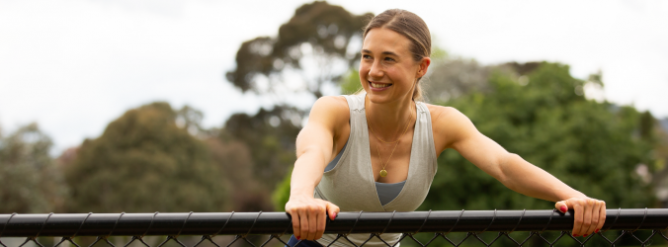Living well with IBD
Your lifestyle can impact your gut health. See below for some tips on living well with IBD.

Your lifestyle can impact your gut health. See below for some tips on living well with IBD.

8 MIN READ

Diet and weight
Maintaining a healthy weight is a common problem for people living with inflammatory bowel disease (IBD), as issues with the gastrointestinal tract can restrict the uptake of important nutrients.
Being under- or overweight can have consequences for your health and lead to further complications including a weakened immune system and a greater risk of anemia, hair loss and infertility.
When you have IBD, food needs to stay on your mind. To keep your weight at an ideal level, you need to be aware of trigger foods, safe foods, your nutrient intake and your calorie count. You may find it helpful to keep a food journal.
If you’re concerned about your diet and how this may be affecting your IBD, you should consult with your doctor. A referral to an accredited dietitian can also be useful – their expertise in nutrition and formulating healthy eating plans can help you ensure you’re getting the right mix of vitamins and minerals without eating anything that will set off your IBD symptoms.
Always remember, keeping your body at a healthy weight whilst living with IBD is achievable and something that you don’t need to do on your own. Support is out there, so make sure you get it when you need it.
Foods and/or supplements containing probiotics (good bacteria) may aid in the management of your condition.1 In addition to the treatment(s) recommended by your specialist.
Your gut is full of microorganisms, including bacteria – some of which are good and others which are not. The healthy flora in your gut (termed the microbiota) aid digestion and keep unhealthy microbes in check. A healthy microbiota also plays an important role in the proper development and function of the immune system and helps to maintain the integrity of the gut mucosal barrier.2
There is a growing body of evidence showing that probiotics may improve intestinal microbial balance, enhance gut barrier function and improve local immune response.3
While research continues, you can still find ways to introduce probiotics into your diet and reap the health benefits of a healthier microbiota.
Like any change to your diet or treatment plan, you should discuss increasing your intake of probiotics with your doctor.
1. Hill C et al. Nat Rev Gastroenterol Hepatol 2014; 11: 506–514.
2. Jandhyala SM et al. World J Gastroenterol 2015; 21: 8787–8803.
3. Durchschein F et al. World J Gastroenterol 2016; 22: 2179–2294.
FODMAPs (fermentable oligo-di-monosaccharides and polyols) are complex molecules found in certain foods and drinks, such as honey, leeks, baked beans, prunes and apples.
Whilst foods containing FODMAPs are not harmful, people with an inflammatory bowel disease find it hard to digest them. As a result, these complex molecules end up fermenting in your intestines, releasing gas which can cause bloating, pain and sometimes diarrhoea.
Monash University’s Low FODMap recipes may be of interest to you.
The low FODMAP diet should only be attempted with the advice and support of a dietician, and as always, you should consult your doctor.
1. Durchschein F et al. World J Gastroenterol 2016; 22: 2179–294.
2. Gibson, P. R. (2017). Use of the low-FODMAP diet in inflammatory bowel disease. Journal of Gastroenterology and Hepatology, 32, 40-42. https://doi.org/10.1111/jgh.13695 (https://research.monash.edu/en/publications/use-of-the-low-fodmap-diet-in-inflammatory-bowel-disease).
Some of the hardest things to give up when you have inflammatory bowel disease (IBD) are desserts and sweet treats. Refined sugar can upset your digestive system and some ingredients in sweet dishes – such as nuts and dairy products – may also disagree with you.
So, when it is 3pm and you’ve hit that slump (you know the one), don’t be tempted to dive into the cookie jar. Try these IBD-friendly sweet delights instead - just click the links and get cooking.
Whilst the above recipes will be perfectly suited to many IBD sufferers, not everyone’s digestive system will welcome the same combination of ingredients. Regular conversations with your healthcare team, along with a detailed food diary, are your best bet for identifying the foods that work for you, as well as those that don’t.
Eating a balanced diet when you suffer from inflammatory bowel disease (IBD) can be challenging. People who live with Crohn’s or ulcerative colitis may find that many healthy and nutritious foods are now off-limits, as they can aggravate their condition and cause flare ups.
Raw fruits and vegetables often pose the most problems for IBD sufferers. These raw foods tend to have a crunchy texture and be high in fibre. Many people with IBD find it difficult to digest these foods and the high fibre content can exacerbate common IBD symptoms such as bloating, flatulence and diarrhoea.
You can take the ‘ouch’ out of some of these nutritious foods by preparing them in different ways.
Stewing is a great option for tough-to-digest fruits and vegetables. Stewed fruits are particularly tasty and can be consumed on their own or with accompaniments such as yoghurt or porridge for breakfast. Stewing vegetables is also a great way to make them softer and easier to digest whilst ensuring you’re still absorbing plenty of the nutrients they have to offer.
Steaming softens hard-to-digest veggies like broccoli without sacrificing too much of the flavour or nutrients in the process. Steaming is also a very lean cooking technique, which makes it great for the waistline. Try pairing steamed fish like salmon (which is packed with ulcerative colitis-friendly omega-3 oils) with some steamed greens like beans and broccoli.
Roasting veggies and fruits can help to break down fibre, making these foods more easily digestible. Roasted veggies make great side dishes for dinner. Roasting fruits also works wonders. Baked pears, cherries and stone fruits are not only friendlier on your digestive system, they also taste delicious!
4 MIN READ
Sport & exercise

It isn’t always easy to keep active when you have inflammatory bowel disease (IBD). Fatigue, pain, and worries about having an ‘accident’ can all stand in your way. Although, there are lots of benefits to keeping active. Regular activity can help improve your overall health, reduce inflammation, and keep your bones strong. Getting active is also great for stress relief.
Weight-bearing activity is great for IBD. Having IBD might affect your ability to absorb calcium and vitamin D (which are both important for bone health), and cause osteoporosis (a weakening of the bones) later in life. Some treatments such as steroids can also negatively affect your bones. Weight-bearing activities are where your bones are supporting the weight of your body. For example, walking, yoga and golf all include actions where your body weight is supported by your bones.
So, by staying active with weight-bearing activities, you can help your bones stay healthy and strong.1
1. Ali T et al. Am J Med. 2009; 122: 599–604.
You’ll quickly find that your colostomy bag doesn’t limit you at all. Sure, you may need to make a few tweaks to your wardrobe and get in the habit of carrying a small supplies kit, but beyond that, it is business as usual. Here’s a few suggestions on feeling confident to get back in the gym, or back on the court.
Your first step should be to consult your healthcare team. Talk to them about how your body is coping post-operation and discuss your general energy levels. Your doctor will always be the best judge of how well you’re progressing and will be able to advise whether you have healed sufficiently to resume physical activity.
Next, chat to them about what kind of exercise or sport you want to do. Unfortunately, contact sports and weightlifting will likely to be ruled out as they may pose a danger to your colostomy bag or unhealed stomas. But it is just as easy for you to enjoy the thrill of fast-paced competition in other sports.
Obviously, you’re going to want to ensure that your colostomy bag is snug and secure as you run, jump, swim and lift. Support ostomy belts can be worn underneath gym clothing, keeping the colostomy bag firmly against your torso to prevent it from slipping during vigorous movements.
For all you swimmers out there, there’s always the general paranoia of a leak ruining your day (even though the likelihood of this happening is slim), so use a stick-on pouch and think about lining the edges with waterproof tape. Then it is simply a matter of getting in the habit of keeping spare colostomy bags and accessories in your sports bag, just as you would with a drink bottle and sweat towel.
For all types of sport and exercise, you need to ease back into it slowly. You’ve just undergone a serious operation, so things like pride and ambition need to take a back seat to safety and common sense. You can’t afford to injure your stoma, bring on a hernia, or put your body under any kind of pressure.
As you gradually work your way back up to your pre-operation fitness levels, it can be helpful to keep a diary of your progress and fitness benchmarks, along with notes about how you feel after exercising. Again, how hard you train is something you should discuss with your doctor, as they are in the best position to advise you during your recovery phase and beyond.
5 MIN READ
IBD and Lifestyle

The healing power of a good night’s sleep cannot be overstated for people with inflammatory bowel disease (IBD). A solid night’s sleep is your body’s chance to rest and regenerate.
To help you clock up eight hours of blissful slumber every night, here are a few things to consider.
Are you reading this on your smart phone in bed? If you are, put it down and rest your eyes. Scrolling through a never-ending stream of pointless social media posts and pictures isn’t a smart way to relax.
Approach your sleep in the same way you manage your IBD by listening to your body when it is tired. Switch off your phone, or at least put your phone on ‘do not disturb’ and get the recommended eight hours of sleep.
Your bedroom is your haven. It is meant to be a peaceful place where you can unwind and recharge your batteries, free of obstacles and distractions that prevent you from relaxing.
TVs, computers, tablets, phones, game consoles, and pets all belong in your lounge room. Your bedroom is for sleep, intimacy, and curling up with a good paperback book – nothing else.
We also recommend having crisp, clean sheets, a darkened room, and heavy blinds to block out the noise.
To properly prepare your body for sleep, there are a few simple habits you can adopt that will get you ready for bed.
Eating dinner earlier can sometimes mean that any unexpected cramps come earlier rather than later, giving you more time to overcome them prior to going to bed. Many people also find a soothing herbal tea can settle an upset tummy, so a warm caffeine-free cuppa just before bed is a great habit to adopt.
The relationship between a healthy night’s sleep and your IBD is a cyclical one – as soon as one is negatively affected, it has a flow-on effect with the other. So, remember, a good night’s sleep isn’t just about keeping you focused and calm, your digestive system needs some rest too.
We’ve all read the warnings on the packs. We’ve all seen the horror-movie public service ads. We’ve all heard it from doctors, family and friends. Smoking is bad for your health! And yet, millions of Australians suck in harmful chemicals every day.1
If you smoke and you suffer from inflammatory bowel disease (IBD), it’s time to change your lifestyle for the better. Deciding to quit is not only great for your overall health, it will also have a positive effect on your IBD.
We’ve all heard that second-hand smoke is bad for children – but did you know that early exposure to cigarette smoke increases their risk of developing Crohn’s disease later in life?
Smoking can also speed up the progression (worsening) of Crohn’s disease in active smokers. Research shows that smokers with Crohn’s disease are more likely to be hospitalised, have more frequent flare ups and worse pain, and are more likely to need surgery.3
Smoking can be a tough habit to quit, but you don’t have to go it alone. There are lots of options out there, from counselling and hypnosis, to laser therapy, nicotine patches and gum. It is a matter of finding the option that works for you, and more importantly, finding the option that you can stick with.
Before embarking on any major lifestyle change it is important to consult with your doctor about how these will affect your IBD (especially if you’re considering anything like supplements or nicotine gums/patches). Your doctor may also be able to refer you to services or resources to help you quit and stay smoke-free for good.
1. Australian Bureau of Statistics. 4364.0.55.001 - National health survey: First results, 2014–15: Smoking. Available at www.abs.gov.au/ausstats/abs@.nsf/Lookup/by%20Subject/4364.0.55.001~2014-15~Main%20Features~Smoking~24 (accessed 18 July 2017).
2. Nos P and Domènech E. World J Gastroenterol 2011; 17: 3567–3574.